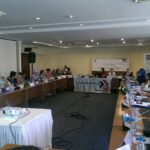11 August, 2016Women trade unionists from IndustriALL Global Union affiliates in the MENA region are to launch a campaign to combat violence against women in the workplace, following an IndustriALL and FES workshop in Tunis.
Thirty-two women trade unionists from nine MENA countries took the initiative for the new campaign during the workshop to promote gender equality and prevent violence against women at the workplace on 28 to 30 July.
During discussions, participants said that violence against women in the workplace is increasing and that the law does often not protect them from harassment at work. Some women complained that women workers were shouted at by men and touched inappropriately. In some cases, women were not taken off heavy load-bearing jobs when pregnant, leading to miscarriages.
The regional and national networks resolved to launch a one-year campaign on violence against women at the workplace , and conduct a series of national activities, while keeping in touch through social media.
IndustriALL’s assistant general secretary and director for women, Monika Kemperle, said:
“Women suffer all types of violence in the workplace and trade unions can play a vital role in stopping abuse. The one-year campaign in the region by IndustriALL’s MENA women network will be crucial in raising awareness of the issue. In addition, the more women that are in decision-making positions in trade unions, the better they will advocate women’s rights at work.”
Participants revealed the obstacles towards gender equality in the workplace and trade union structures, which are both male-dominated. They also explained that it was difficult for women to attend trade union meetings due to child and family responsibilities, which invariably fall upon women despite their own work commitments. They also spoke of barriers to trade union participation as a result of traditional stereotypes – that see men as the decision-makers.
Women said that the election of trade union officials and leaders every four years was too long. They said four years is a long time to hold office and many women do not have the time to devote to trade union activities on top of their work and family commitments. They proposed elections every two years and that women could share the workload of union roles.
Participants also highlighted the need to better communicate with other women about the benefits of trade union membership, but this would require assistance and training.
Although in many countries the laws are clear against gender discrimination, particularly maternity protection, in practice women said the laws are not implemented and many women lose their jobs when they get pregnant. Similarly, wage negotiations monopolized by men and while equal pay might be enshrined in law, in practice it is not realized. Furthermore, if a woman has a good qualification in a male-dominated job, preference will always go to a man, even if they are equally skilled.
The workshop addressed the ways in which unions can fight for women’s rights, whether through campaigning, raising awareness and collective bargaining agreements.
Participants also decided to set up new IndustriALL national networks in Bahrain, Jordan, Kuwait, Mauritania and Palestine that will join IndustriALL’s existing networks in the region in Egypt, Lebanon, Morocco and Tunisia. IndustriALL MENA Women Network was launched last year in Beirut and elaborated the key areas of work.
Finally, the participants supported the resolution for a 40 per cent quota for women’s representation in IndustriALL’s structures.




